|
|
|
Sort Order |
|
|
|
Items / Page
|
|
|
|
|
|
|
| Srl | Item |
| 1 |
ID:
168670
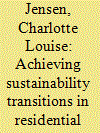

|
|
|
|
|
| Summary/Abstract |
Reducing greenhouse gas emissions in the residential sector is central to European energy policy. However, the speed and scale of sustainable energy transitions need to accelerate. There is a growing consensus that meeting energy targets is highly dependent on interrelated socio-material and cultural aspects of energy use. New ways of framing energy demand that go beyond dominant efficiency- and behavior models are needed. Recognizing these concerns, this paper reports on a review of 1067 Sustainable Energy Consumption Initiatives (SECIs) that aim to reduce residential energy use across 30 European countries. The initiatives are categorized and a corresponding Problem Framing Typology (PFT) is developed, highlighting important aspects of different types of problem framings. The typology contains four categories including 1) Changes in technology; 2) Changes in individual behavior; 3) Changes in everyday life situations; 4) and Changes in complex interactions. Applying the PFT to the 1067 SECIs shows that the vast majority (75%) of SECIs are positioned within category 1 and 2, indicating a lingering bias towards technocratic consumer behavioral strategies. The limitations of such approaches are discussed, and it is argued that systematically addressing interactions between technology, businesses, culture and everyday-life is more likely to lead to long-term transformation.
|
|
|
|
|
|
|
|
|
|
|
|
|
|
|
|
| 2 |
ID:
168650
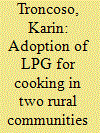

|
|
|
|
|
| Summary/Abstract |
In 2011, a government initiative provided Liquefied Petroleum Gas (LPG) stoves and cylinders to almost 1000 rural families in Chiapas, Mexico. In 2017, the Pan-American Health Organization (PAHO) conducted an evaluation of cooking practices among the beneficiaries of these stoves.
|
|
|
|
|
|
|
|
|
|
|
|
|
|
|
|
| 3 |
ID:
168661
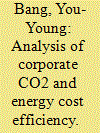

|
|
|
|
|
| Summary/Abstract |
Corporate eco-efficiency should be managed to take environmental responsibility for climate change mitigation. However, firms have difficulty determining what eco-efficiency metric is appropriate, what key performance indicators are to be managed, and what characteristics of environmental reporting are effective for environmental management. Thus, this study develops and measures a corporate CO2 and energy cost efficiency; and analyzes the key performance indicators and industrial characteristics for this cost efficiency and the key characteristics of environmental reporting to effectively enhance the cost efficiency. The cost efficiencies of 119 firms are measured by using a data envelopment analysis (DEA). A statistical Tobit regression analysis is used to analyze the key performance indicators and the characteristics of effective environmental reportings. The cost efficiencies of the firms are overall low and affected by industrial characteristics, i.e., assembly- or process-based manufacturing. The key performance indicators are significantly related with administration cost and energy intensities. The effective environmental reportings have a common characteristic that requires qualitative real evidences for environmental improvement, as well as quantitative environmental performances. This study provides valuable information for corporate environmental management and policy to effectively enhance the eco-efficiency of firms.
|
|
|
|
|
|
|
|
|
|
|
|
|
|
|
|
| 4 |
ID:
168658


|
|
|
|
|
| Summary/Abstract |
Improving household access and use of clean energy has been central to global development efforts in recent years. The negative effects of energy poverty on health, climate, livelihoods and economy has led to increased investments towards achieving universal access to clean energy. However, significant deprivations in clean energy remains, especially in developing countries. Energy poverty may involve simultaneous deprivations on availability and affordability of clean energy. Using repeated cross-sectional data, this paper assesses the extent and determinants of multidimensional energy poverty in Ghana between 2008 and 2014. The paper finds that though the level of multidimensional energy poverty reduced in Ghana between 2008 and 2014, the incidence and intensity of multidimensional energy poverty remains high. Further, we find substantial subgroup differences in multidimensional energy poverty. The results reveal significant relationships between household characteristics and the multidimensional energy poverty status of households. The reductions in multidimensional energy poverty were driven by the coefficient effects attributable to structural and policy changes over the period. To facilitate universal access to clean energy and reduce the degree of multidimensional energy poverty, there is the need to intensify the LPG promotion campaign and adopt strategies that target left-behind and underserved groups.
|
|
|
|
|
|
|
|
|
|
|
|
|
|
|
|
| 5 |
ID:
168667
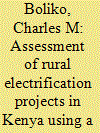

|
|
|
|
|
| Summary/Abstract |
This research is driven by the goal to develop human survivability studies, a solution oriented, trans-disciplinary academic approach for resolving multiple complex societal challenges. Given persisting poverty and inequality in rural areas of developing countries, as well as their vulnerability to the effects of climate change, there are high expectations that rural electrification using renewable energy can contribute to their sustainable development. We therefore use a sustainability framework to assess the contributions of four electrification projects in rural Kenya in ensuring the long-term well-being of local residents and future generations. Our results show that off-grid electrification projects run by the private sector were the better performers in the assessment. While more research is necessary to improve robustness, our preliminary policy recommendations are that Kenyan policy makers should provide further support to private sector-led off-grid solar electrification efforts.
|
|
|
|
|
|
|
|
|
|
|
|
|
|
|
|
| 6 |
ID:
168688
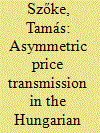

|
|
|
|
|
| Summary/Abstract |
The article compares the market power of Hungarian electricity traders during the partially liberalised transitional market model from 2004 to 2008 and the fully liberalised period lasting since 2008. In our empirical work, we use an econometric modelling technique based on asymmetric price transmission (APT) theory to measure the market power of traders in the electricity market. The aim of our work is to conduct a quantitative analysis of the Hungarian electricity trading market by applying the APT modelling technique – used widely in agro-economic analyses – to electricity markets. The intuition behind the method is the assumption that asymmetric price transmission refers to deviations from perfect competition. The research has found that different regulation regimes lead to different patterns of asymmetry in price transmission and the results underline that the market position of electricity traders have improved since the introduction of the liberalised market model. By mapping the results of the APT model to the actual policy and market changes we argue that the APT method is a useful tool for analysing the competition on electricity markets.
|
|
|
|
|
|
|
|
|
|
|
|
|
|
|
|
| 7 |
ID:
168702


|
|
|
|
|
| Summary/Abstract |
In this article we investigate the dynamic relations between crude oil price returns and a set of energy price returns, namely diesel, gasoline, heating, and the natural gas. This is performed by means of Granger non-causality tests for US closing spot prices over the period from January 1997 to December 2017. In previous studies this has been done by testing for the added predictive value of including lagged returns of one energy price in predicting the conditional expectation of another. In this paper we instead focus on different ranges of the full conditional distribution, and thus market states, within the framework of a dynamic quantile regression model, and identify the quantile ranges from which causality arises. The results constitute a richer set of findings than what is possible by just considering a single moment of the conditional distribution, which can be useful for implementing better substitution investment strategies and effective policy interventions. We find several interesting uni-directional dynamic relations between the employed energy price returns, especially in the tail quantiles, but also bi-directional causal relations between energy price returns for which the classical Granger non-causality test suggests otherwise. Our results are robust to alternative measures of the price of oil and different data frequencies.
|
|
|
|
|
|
|
|
|
|
|
|
|
|
|
|
| 8 |
ID:
168653
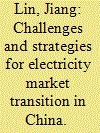

|
|
|
|
|
| Summary/Abstract |
China is currently pursuing electricity reforms that will create wholesale markets for electricity. Electricity markets hold considerable promise for facilitating China's transition to clean energy systems, but face obstacles. The most significant obstacle to market reforms is their potential financial impact on coal generation, which currently accounts for most of China's generating capacity. In this paper, we examine the impact of market reforms on coal generation in China, using Guangdong Province as a case study. We find that, in the near term, market prices are likely to lead to significant decreases in net revenues for coal generators relative to the current benchmark tariff, with 40%–60% of coal generation capacity unable to cover the cost of remaining in commercial operation. We estimate that existing coal generators in Guangdong had 94 billion yuan (US$14 billion) in outstanding debt in 2016, creating large risks for banks and raising questions about the potential impacts of electricity market reforms on China's financial industry. The impact of market reforms on coal generators creates two problems—transition and resource adequacy. The development of mechanisms for long-term resource adequacy provides a common solution to both of these problems.
|
|
|
|
|
|
|
|
|
|
|
|
|
|
|
|
| 9 |
ID:
168642
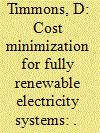

|
|
|
|
|
| Summary/Abstract |
Climate change is the world's most prominent environmental problem, and fossil-fuel combustion is its primary cause. To set carbon reduction goals, policy makers require information on feasibility and cost of renewable energy systems. In this study, we describe an economic approach to modeling a national electricity system based entirely on renewable sources, using the island-nation of Mauritius as a case study.
|
|
|
|
|
|
|
|
|
|
|
|
|
|
|
|
| 10 |
ID:
168677


|
|
|
|
|
| Summary/Abstract |
This paper analyzes the impact of the EU ETS on CO2 reduction in the German electricity sector. We find an ETS-induced emission abatement which is not exceeding 6% of total emissions with a maximum already in 2010. Thereafter the ETS has not induced additional reductions. This outcome corresponds to the recent debate about sub-optimal performance of the EU ETS caused by excessive allowances. Following up on this we develop a unilateral flexible cap to eliminate demand side effects which lead to excessive allowances. The unilateral flexible cap is based on emission intensities. Using the works of Newell and Pizer (2008); Sue Wing et al. (2009) we prove that an intensity-based emission cap is advantageous in the German electricity sector when compared to an absolute cap. An ex-post analysis shows that the amount of excessive allowances resulting from the economic crisis during the second trading period could have been significantly lowered with a unilateral flexible cap. This approach also decouples the EU ETS from a simultaneous promotion of renewable energy.
|
|
|
|
|
|
|
|
|
|
|
|
|
|
|
|
| 11 |
ID:
168664


|
|
|
|
|
| Summary/Abstract |
Energy storage technologies are receiving increasing attention in the UK and around the world as a means of increasing penetration of inflexible low-carbon electricity generation and optimising investment in energy infrastructure required to meet international decarbonisation goals. Research into the social acceptability of energy infrastructure has compellingly illustrated the importance of societal perceptions in the successful deployment of new infrastructure. However to date, no study has empirically examined public perceptions across the broad range of storage technologies available. We address this gap by presenting qualitative findings from four deliberative workshops held with members of the British public. We show that citizens underestimate the challenge of growing volumes of inflexible low-carbon electricity generation, and respond to storage technologies through reference to commonly perceived risks and benefits. When participants discussed how storage might be funded and managed, additional evaluative criteria emerged centred around equity, vulnerability, independence and convenience. Our findings suggest that perceptions of storage technologies tend to be ambivalent, and that acceptance is likely to be contingent on whether storage technologies can be designed, regulated and governed in ways which reduce technical concerns over safety, environmental impacts and reliability, while meeting societal desires for equity and the protection of vulnerable groups.
|
|
|
|
|
|
|
|
|
|
|
|
|
|
|
|
| 12 |
ID:
168665
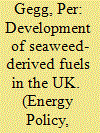

|
|
|
|
|
| Summary/Abstract |
Macroalgae (seaweed)-derived fuels are gaining increasing attention due to the high rate of seaweed growth, its lack of lignocellulose (which makes for energy-efficient processing), its lack of need for land or freshwater, and its potential suitability for commercial applications in the UK. However, while technological issues are progressively being solved, wider issues of stakeholder and public perception have largely been ignored, potentially hindering the development of this technology. This research fills this gap by conducting 19 interviews with stakeholders and 7 focus groups with members of the public to gain a deeper and broader understanding of perceptions of macroalgae-derived fuels. The results highlight the technological promise and confidence in the potential of macroalgae-derived fuels. However, they also emphasise conflicts and uncertainties among stakeholders (e.g. competition with other high-value products derived from macroalgae) and the general public (e.g. conflict with marine users). This paper provides insight into potential social resistance and key issues in the macroalgae-to-fuels supply chain. This information will enable two-way communication between everyone involved and increase the likelihood of successfully developing this supply chain. Key policy issues are discussed to facilitate this communication and encourage investment in the process.
|
|
|
|
|
|
|
|
|
|
|
|
|
|
|
|
| 13 |
ID:
168696
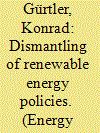

|
|
|
|
|
| Summary/Abstract |
Despite their increasing cost competitiveness, the continued expansion of renewable energy remains dependent on policy support. Moreover, the dismantling of renewable energy policies in a number of former pioneer countries indicates that continued policy support is not a foregone conclusion. Yet, in light of the accelerating expansion of renewable energy, the dismantling of renewable energy policies has captured comparatively less attention than the rapid spread of support schemes. This article seeks to fill this important knowledge gap by developing and testing a framework for the analysis of policy dismantling processes in the renewable energy sector. It applies the framework to conduct a comparative analysis of policy dismantling in Spain and the Czech Republic. Both countries represent European pioneers of renewable energy support who subsequently dismantled their policies. The paper finds that the inter-relationship between policy design and the broader configuration of the political economy in the energy sector are key for understanding dismantling processes. It offers a number of conclusions for the design of more robust renewable energy support policies.
|
|
|
|
|
|
|
|
|
|
|
|
|
|
|
|
| 14 |
ID:
168686


|
|
|
|
|
| Summary/Abstract |
Dominant conceptual models describe energy innovations as struggles between regime and niche actors that develop at the margins of established energy systems, and work against dominant energy regimes. Contrary to this conceptualisation, this paper argues that energy innovations develop through a more nuanced set of relationships, which lead to distinct innovation outcomes. Based on three case studies in Germany and Scotland, this paper finds that energy innovations develop in accordance with, independent of, or in opposition to regime structures, showing that a project's relative position within these structures influences the type and quality of its development. Making use of situational analysis, the paper challenges essentialising tendencies among scholars working with the multi-level perspective. Instead of understanding regime and niche as separable entities, situational analysis allows understanding how agency and innovations of local renewable energy projects transcend the boundaries of levels or systems. Policy makers are advised to acknowledge these complex interrelations. Side effects of policies deliberately directed towards other sectors might have significant effects on the energy sector.
|
|
|
|
|
|
|
|
|
|
|
|
|
|
|
|
| 15 |
ID:
168699


|
|
|
| 16 |
ID:
168645


|
|
|
|
|
| Summary/Abstract |
The building energy efficiency labeling (BEEL) scheme has been adopted in China since 2008. However, until now, its effect on the actual building energy efficiency has not been accurately established. The objective of this study was to investigate this effect through a case study in Shanghai, China. Additionally, by performing a thorough review, potential barriers for implementing the BEEL scheme in major areas of China were analyzed. The results indicated that 1) the energy use intensity of labeled commercial office buildings in Shanghai followed a normal distribution, with an average value of 79.14 kWh/(m2a); 2) the energy-saving rate and energy consumption exhibited an inversely proportional relationship for residential buildings, but this relationship was not applicable for commercial office buildings; 3) for Shanghai, ground source heat pumps (GSHPs) and variable refrigerant volume systems are more appropriate for commercial office buildings, and GSHPs and split air conditioners are more useful for residential buildings. The potential barriers were classified into three main categories—technical, political, and awareness—and corresponding solutions were proposed. The authors hope that this study can promote the adoption of the BEEL scheme in China.
|
|
|
|
|
|
|
|
|
|
|
|
|
|
|
|
| 17 |
ID:
168654
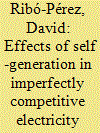

|
|
|
|
|
| Summary/Abstract |
Domestic rooftop photovoltaic (PV) energy can reduce net electricity demand, and therefore reduce energy prices through a merit-order effect. This reduces profits of all incumbents in the electricity markets. In addition, in imperfectly competitive markets, PV self-generation reduces prices through a reduction in market power. The first effect may warrant additional policy interventions to maintain cost recovery, but the second is much more desirable, as it simultaneously helps increase sustainability and competition. However, unlike a simple reduction in market prices, the competition effect affects all incumbents differently. Since resistance from incumbents can be a significant barrier to energy policy change, it is important to understand the distribution of effects. This paper does so for the Spanish market. A Nash-Cournot model and a simplified representation of the Spanish electricity market is used to determine the merit-order and competition effects of an increase in solar self-generation. We conclude that both are important, and that their analysis is essential to inform the social debate around PV policy.
|
|
|
|
|
|
|
|
|
|
|
|
|
|
|
|
| 18 |
ID:
168656


|
|
|
|
|
| Summary/Abstract |
Rural electrification has the potential to transform rural lives and livelihoods by allowing households to use a variety of electric appliances. However, empirical evidence on how rural electrification translates into appliance ownership and usage remains understudied across contexts. Here we use data from the 2014–2015 ACCESS survey in six energy-poor states of India to understand the dynamics of appliance stock accumulation as a function of time since electrification. We find that, controlling for a number of variables, each additional year of electricity access leads to: 1) incrementally higher ownership rates of more power-intensive appliances, 2) increased likelihood of a higher total stock of appliances, and 3) increased probability of owning key appliances, especially TVs, fans, and pressure cookers. These results may help to explain why short-term impact evaluations sometimes find weak evidence for benefits of rural electrification; they also underscore the importance of realistic forecasts of energy demand growth over time after rural electrification.
|
|
|
|
|
|
|
|
|
|
|
|
|
|
|
|
| 19 |
ID:
168695


|
|
|
|
|
| Summary/Abstract |
With rapid economic growth in the past four decades, China has grown into the world's largest fossil fuel consumer and CO2 emitter. Surprisingly from a negligible level in early 2000s, the country has also become a global leader in solar PV utilization. In the past two decades of renewable energy development, wind power dominated before 2012, while annual solar PV installation quickly caught up afterwards. This article explains the solar PV trajectory as China followed the comparative advantage of wind power and solar PV, contingent upon their relative costs, for achieving renewable energy goals. We further explore why China with a tradition of central planning could approach the least-cost, market-oriented roadmap. Several factors were effective in enabling the “comparative advantage strategy” without central planning but mainly bottom-up decision making, including cost-conscious state-owned electric grid corporations, policy and goal evolution by implementation selection, and constrained solar lobby. This strategy could provide helpful insights for China and other countries for achieving their renewable energy development and CO2 mitigation commitments as well as other major policy goals.
|
|
|
|
|
|
|
|
|
|
|
|
|
|
|
|
| 20 |
ID:
168678


|
|
|
|
|
| Summary/Abstract |
Starting from sustainable development, energy efficiency and energy management fundamentals, a detailed analysis of the energy management systems standard ISO 50001:2011 was carried out from the viewpoint of sustainable development. The purpose of the analysis was to assess the effectiveness of its implementation, to identify the existence of gaps and to develop improvements capable of fulfilling the identified gaps. The effectiveness and the results of ISO 50001:2011 implementation, combined with the construction of an ideal energy management system allowed the identification of four gaps. The contribution to sustainable development of these gaps was determined. A detailed framework analysis of the four identified gaps followed, reviewing the associated ISO 50001:2011 standard requirements and converting them into six potential improvements. These were then proposed to 146 experts in energy management systems via an on – line survey. Experts were divided into three groups, dependent upon their specific areas of expertise, in order to obtain legitimate opinion and validation. The results of this survey, with a global 64.4% positive concordance, showed clear evidence that the six selected improvement proposals, could contribute positively to the evolution of ISO 50001 towards energy management for sustainable development.
|
|
|
|
|
|
|
|
|
|
|
|
|
|
|
|
|
|
|
|
|